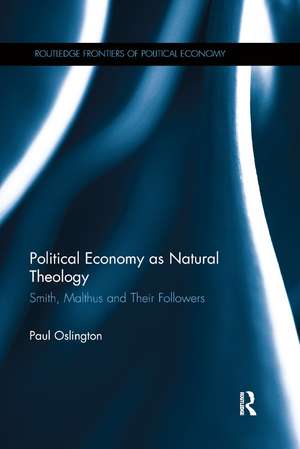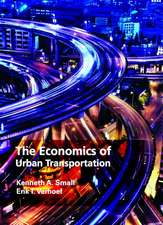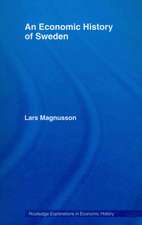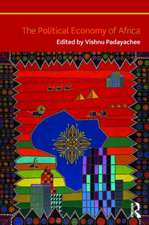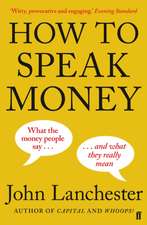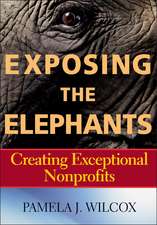Political Economy as Natural Theology: Smith, Malthus and Their Followers: Routledge Frontiers of Political Economy
Autor Paul Oslingtonen Limba Engleză Paperback – 12 dec 2019
Since the early 20th century, economics has been the dominant discourse in English-speaking countries, displacing Christian theology from its previous position of authority. This path-breaking book is a major contribution to the interdisciplinary dialogue between economics and religion.
Oslington tells the story of natural theology shaping political economy in the late 18th and early 19th centuries, emphasising continuing significance of theological issues for the discipline of economics. Early political economists such as Adam Smith, Josiah Tucker, Edmund Burke, William Paley, TR Malthus, Richard Whately, JB Sumner, Thomas Chalmers and William Whewell, extended the British scientific natural theology tradition of Francis Bacon, Robert Boyle and Isaac Newton to the social world. This extension nourished and shaped political economy as a discipline, influencing its theoretical framework, but perhaps more importantly helping legitimate political economy in the British universities and public policy circles. Educating the public in the principles of political economy had a central place in this religiously driven program. Natural theology also created tensions (especially reconciling economic suffering with divine goodness and power) that eventually contributed to its demise and the separation of economics from theology in mid-19th-century Britain. This volume highlights aspects of the story that are neglected in standard histories of economics, histories of science and contemporary theology.
Political Economy as Natural Theology is essential reading for all concerned with the origins of economics, the meaning and purpose of economic activity and the role of religion in contemporary policy debates.
| Toate formatele și edițiile | Preț | Express |
|---|---|---|
| Paperback (1) | 381.21 lei 6-8 săpt. | |
| Taylor & Francis – 12 dec 2019 | 381.21 lei 6-8 săpt. | |
| Hardback (1) | 1108.10 lei 6-8 săpt. | |
| Taylor & Francis – 26 iul 2017 | 1108.10 lei 6-8 săpt. |
Din seria Routledge Frontiers of Political Economy
-
 Preț: 309.90 lei
Preț: 309.90 lei -
 Preț: 309.79 lei
Preț: 309.79 lei -
 Preț: 316.03 lei
Preț: 316.03 lei -
 Preț: 310.95 lei
Preț: 310.95 lei - 9%
 Preț: 866.82 lei
Preț: 866.82 lei -
 Preț: 309.12 lei
Preț: 309.12 lei -
 Preț: 311.61 lei
Preț: 311.61 lei -
 Preț: 286.99 lei
Preț: 286.99 lei -
 Preț: 327.83 lei
Preț: 327.83 lei -
 Preț: 311.87 lei
Preț: 311.87 lei -
 Preț: 302.76 lei
Preț: 302.76 lei - 9%
 Preț: 938.48 lei
Preț: 938.48 lei -
 Preț: 152.67 lei
Preț: 152.67 lei -
 Preț: 151.97 lei
Preț: 151.97 lei -
 Preț: 318.54 lei
Preț: 318.54 lei -
 Preț: 317.95 lei
Preț: 317.95 lei -
 Preț: 310.01 lei
Preț: 310.01 lei -
 Preț: 326.49 lei
Preț: 326.49 lei -
 Preț: 155.44 lei
Preț: 155.44 lei -
 Preț: 309.79 lei
Preț: 309.79 lei -
 Preț: 328.76 lei
Preț: 328.76 lei -
 Preț: 281.72 lei
Preț: 281.72 lei -
 Preț: 286.58 lei
Preț: 286.58 lei -
 Preț: 386.12 lei
Preț: 386.12 lei -
 Preț: 353.78 lei
Preț: 353.78 lei -
 Preț: 325.09 lei
Preț: 325.09 lei -
 Preț: 310.55 lei
Preț: 310.55 lei -
 Preț: 371.95 lei
Preț: 371.95 lei -
 Preț: 324.87 lei
Preț: 324.87 lei -
 Preț: 312.86 lei
Preț: 312.86 lei -
 Preț: 374.16 lei
Preț: 374.16 lei -
 Preț: 329.09 lei
Preț: 329.09 lei -
 Preț: 348.22 lei
Preț: 348.22 lei - 28%
 Preț: 1047.06 lei
Preț: 1047.06 lei - 18%
 Preț: 1169.45 lei
Preț: 1169.45 lei - 18%
 Preț: 1555.17 lei
Preț: 1555.17 lei - 18%
 Preț: 1048.43 lei
Preț: 1048.43 lei - 18%
 Preț: 1059.84 lei
Preț: 1059.84 lei - 31%
 Preț: 767.47 lei
Preț: 767.47 lei - 18%
 Preț: 731.92 lei
Preț: 731.92 lei - 26%
 Preț: 822.54 lei
Preț: 822.54 lei - 18%
 Preț: 1796.21 lei
Preț: 1796.21 lei - 26%
 Preț: 1184.91 lei
Preț: 1184.91 lei - 18%
 Preț: 1120.23 lei
Preț: 1120.23 lei - 15%
 Preț: 700.95 lei
Preț: 700.95 lei - 18%
 Preț: 1116.31 lei
Preț: 1116.31 lei - 22%
 Preț: 299.52 lei
Preț: 299.52 lei
Preț: 381.21 lei
Nou
Puncte Express: 572
Preț estimativ în valută:
72.95€ • 76.71$ • 60.27£
72.95€ • 76.71$ • 60.27£
Carte tipărită la comandă
Livrare economică 16-30 aprilie
Preluare comenzi: 021 569.72.76
Specificații
ISBN-13: 9780367865023
ISBN-10: 0367865025
Pagini: 172
Dimensiuni: 156 x 234 x 9 mm
Greutate: 0.25 kg
Ediția:1
Editura: Taylor & Francis
Colecția Routledge
Seria Routledge Frontiers of Political Economy
Locul publicării:Oxford, United Kingdom
ISBN-10: 0367865025
Pagini: 172
Dimensiuni: 156 x 234 x 9 mm
Greutate: 0.25 kg
Ediția:1
Editura: Taylor & Francis
Colecția Routledge
Seria Routledge Frontiers of Political Economy
Locul publicării:Oxford, United Kingdom
Public țintă
Postgraduate and UndergraduateCuprins
1 Introduction
2 Natural Theology: Philosophical and Historical Issues
Introduction
Natural theology and scripture
Varieties of natural theology
The British tradition of scientific natural theology
Natural theology, creation and providence
Natural theology and theodicy
Conclusion
3 Early English Theological Roots of Political Economy
Introduction
Joseph Butler (1692–1752)
Josiah Tucker (1713–99)
William Paley (1743–1805)
Edmund Burke (1729–97)
Conclusion
4 Adam Smith as Natural Theologian
Introduction
Adam Smith’s religious background
Adam Smith's invisible hand
Adam Smith’s theodicy
The future hope, nature and justice in Smith’s system.
Conclusion
5 Natural Theology and the Emergence of Political Economy: Stewart, Malthus, Sumner and Chalmers
Introduction
Further Scottish background: Dugald Stewart
Malthus' Principle of Population and its theodicy
Development of Malthus’ theodicy by JB Sumner
Malthus’ Scottish disciple Thomas Chalmers
Conclusion
6 Progress and Tension: Richard Whately and William Whewell
Introduction
Political Economy at Oxford: Nassau Senior and the responses by Richard Whately and JH Newman
Richard Whately
Political Economy at Cambridge: Richard Jones and William Whewell
Conclusion
7 The Demise of Natural Theology and Separation of Economics from Theology
Introduction
Explaining the separation of economics from theology
Explaining the demise of natural theology
The demise of natural theolog
2 Natural Theology: Philosophical and Historical Issues
Introduction
Natural theology and scripture
Varieties of natural theology
The British tradition of scientific natural theology
Natural theology, creation and providence
Natural theology and theodicy
Conclusion
3 Early English Theological Roots of Political Economy
Introduction
Joseph Butler (1692–1752)
Josiah Tucker (1713–99)
William Paley (1743–1805)
Edmund Burke (1729–97)
Conclusion
4 Adam Smith as Natural Theologian
Introduction
Adam Smith’s religious background
Adam Smith's invisible hand
Adam Smith’s theodicy
The future hope, nature and justice in Smith’s system.
Conclusion
5 Natural Theology and the Emergence of Political Economy: Stewart, Malthus, Sumner and Chalmers
Introduction
Further Scottish background: Dugald Stewart
Malthus' Principle of Population and its theodicy
Development of Malthus’ theodicy by JB Sumner
Malthus’ Scottish disciple Thomas Chalmers
Conclusion
6 Progress and Tension: Richard Whately and William Whewell
Introduction
Political Economy at Oxford: Nassau Senior and the responses by Richard Whately and JH Newman
Richard Whately
Political Economy at Cambridge: Richard Jones and William Whewell
Conclusion
7 The Demise of Natural Theology and Separation of Economics from Theology
Introduction
Explaining the separation of economics from theology
Explaining the demise of natural theology
The demise of natural theolog
Notă biografică
Paul Oslington is Professor of Economics and Dean of Business at Alphacrucis College in Sydney, Australia. He previously held a joint appointment as Professor in the Schools of Business and Theology at Australian Catholic University, and before that Associate Professor of Economics at the University of New South Wales, along with visiting positions at the University of Oxford, University of British Columbia, Regent College Vancouver and Princeton Theological Seminary and University. He is also an honorary Research Professor at the Australian Centre for Christianity and Culture in Canberra.
Recenzii
'Oslington’s work adds clarity to the ongoing battle among intellectual historians for the right to narrate the history of economic thought. In a world where economic principles are often endowed with ‘natural’ authority, people on both ends of the economic spectrum have something to gain by claiming thinkers such as Adam Smith as their intellectual ancestors. As an expert in the ongoing dialogue between economics and Christian theology, Oslington is uniquely placed to explore this foundational period of economic tradition.' Kathryn D. Blanchard, Alma College
"The last two decades have seen a notable “turn to religion,” as it has been called in a
variety of academic disciplines, including economics. Part of this movement is
increased attention to the relationship between economics and religion, and particu>larly theology, from a historical perspective. Paul Oslington’s work on theology
and economics, including an earlier edited volume (Adam Smith as Theologian),
stands at the forefront of this revisionist program, which aims both to more properly
ground historical understandings of the origins of political economy as well as to use
that grounding as a way to begin to reconcile—if not reunite—theology and political
economy."
—Jordan J. Ballor, HOPE reviews
"The last two decades have seen a notable “turn to religion,” as it has been called in a
variety of academic disciplines, including economics. Part of this movement is
increased attention to the relationship between economics and religion, and particu>larly theology, from a historical perspective. Paul Oslington’s work on theology
and economics, including an earlier edited volume (Adam Smith as Theologian),
stands at the forefront of this revisionist program, which aims both to more properly
ground historical understandings of the origins of political economy as well as to use
that grounding as a way to begin to reconcile—if not reunite—theology and political
economy."
—Jordan J. Ballor, HOPE reviews
Descriere
Oslington tells the story of natural theology shaping political economy in the late 18th and early 19th centuries, emphasising continuing significance of theological issues for the discipline of economics. Early political economists such as Adam Smith, T.R. Malthus, Richard Whately, and William Whewell, extended the British scientific natur
